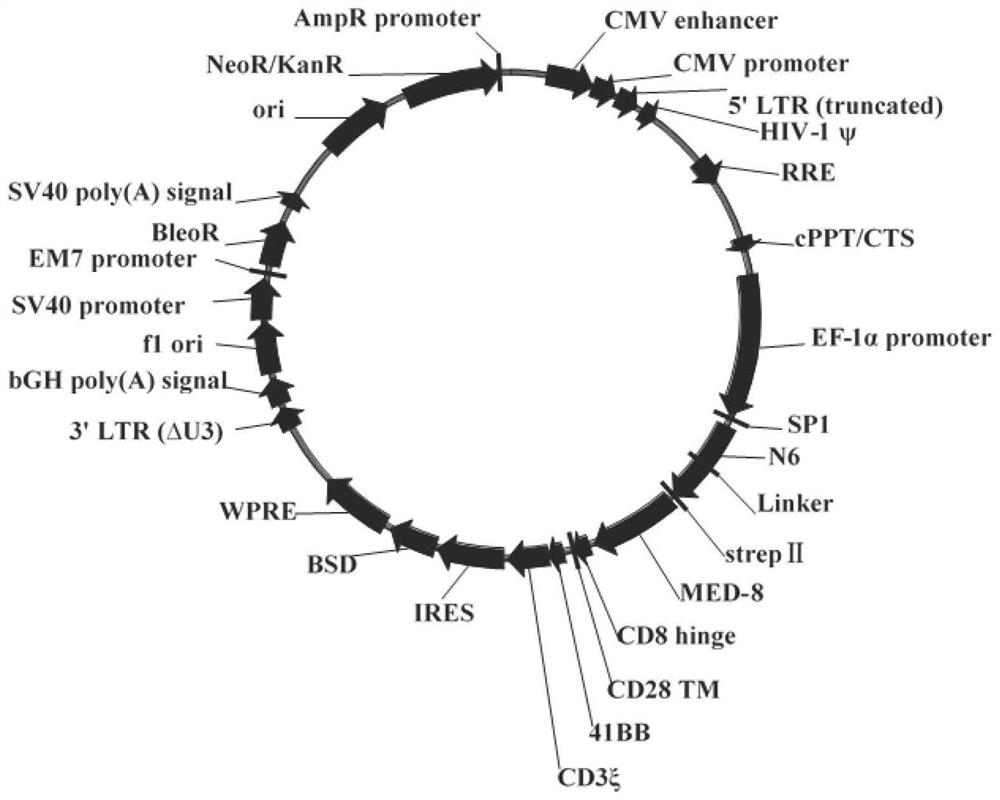A bispecific chimeric antigen receptor, gene, construction method and application for treating HIV infection
A chimeric antigen receptor, bispecific technology, applied in the field of medicine and biology, can solve the problem that CAR-T cannot be effectively removed, and achieve the effect of huge clinical promotion value.
- Summary
- Abstract
- Description
- Claims
- Application Information
AI Technical Summary
Problems solved by technology
Method used
Image
Examples
Embodiment 1
[0034] Example 1: Construction of PTK881-EF1α-N6-MDE-8-01 plasmid
[0035] 1. The sequences SP1-N6 (nucleotide sequence SEQ ID NO.1) and MDE-8 (nucleotide sequence SEQ ID NO.2) were synthesized by Suzhou Jinweizhi Biotechnology Co., Ltd., and the synthesized sequences were cloned into the pUC57 vector superior.
[0036]2. Using the human cDNA library as a template, design primers to amplify fragments CD8 hinge, CD28 transmembrane region, 4-1BB, and CD3ζ respectively, and obtain short fragments of Strep tag II and G4S1 by primer complementation. Using Overlap PCR technology, SP1-scFv-N6, Strep tagⅡ, G4S1, MDE-8, CD8 hinge, CD28 transmembrane region, 4-1BB, CD3ζ were sequentially amplified and connected into EcoR I and BamH I with restriction sites The structure diagram of N6-MDE-8-CAR is as follows figure 1 shown.
[0037] Among them, N6-MDE-8-CAR is a single-chain antibody ScFv-N6 and ScFv-MDE-8 with a signal peptide that can recognize the surface of blood tumor cells infec...
Embodiment 2
[0042] Example 2: Preparation and sequencing of plasmids
[0043] 1. Preparation of plasmid
[0044] The DH5α strains containing the plasmid PTK881-EF1α-N6-MDE-8-1 were inoculated into 250 mL of LB culture medium containing 100 μg / mL kanamycin, and cultured overnight at 37°C and 220 rpm. The culture solution was centrifuged at 6000g for 20min at 4°C, and the supernatant was discarded.
[0045] Take out Buffers P1 from the EndoFree plasma mega kit (Qiagen), add 120mL pre-cooled Buffers P1 to the centrifuged E. coli pellet, cover the cap of the centrifuge bottle, shake the centrifuge bottle vigorously to completely disperse the E. coli pellet in Buffers P1 .
[0046] Add 120mL Buffers P2 to the centrifuge bottle, put the cap on the roller mixer, slowly increase the speed to 50rpm, mix thoroughly and place at room temperature for 5min.
[0047] Add 120mL Buffers P3 to the centrifuge bottle, put the cap on the roller mixer, slowly increase the speed to the maximum speed of the ...
Embodiment 3
[0060] Example 3, Preparation of Lenti3-N6-MDE-8-CAR Lentiviral Vector and Live Droplet Detection
[0061] 1. Preparation of lentiviral vector
[0062] Insert 130.0~140.0×10 in the multilayer cell culture flask (Hyperflask) 6 Number of 293T cells (Takara), a total of 560 mL DMEM complete medium (50 mL fetal bovine serum, 5 mL Antibiotic-Antimycotic (100×)), at 37 °C with 5% CO 2 Incubate for 24 hours in the incubator. 320 μg of plasmid (PTK881-EF1α-N6-MDE-8-1: BZ1 plasmid: BZ2 plasmid: BZ3 plasmid=12:10:5:6), 320 μg of plasmid (PTK881-EF1α-C11-1: BZ1 plasmid: BZ2 plasmid: BZ3 plasmid=12:10:5:6) DMEM basal medium was added to 960 μg PEI tube, vortexed, and equilibrated at room temperature for 10 minutes. Mix the above-mentioned 35mL PEI-plasmid mixture with 525mL DMEM complete medium, and replace it into the above-mentioned multi-layer cell culture flask. Place the multilayer cell culture flask at 37 °C with 5% CO 2 After 3 days in the incubator, the cell culture supernata...
PUM
 Login to View More
Login to View More Abstract
Description
Claims
Application Information
 Login to View More
Login to View More - R&D Engineer
- R&D Manager
- IP Professional
- Industry Leading Data Capabilities
- Powerful AI technology
- Patent DNA Extraction
Browse by: Latest US Patents, China's latest patents, Technical Efficacy Thesaurus, Application Domain, Technology Topic, Popular Technical Reports.
© 2024 PatSnap. All rights reserved.Legal|Privacy policy|Modern Slavery Act Transparency Statement|Sitemap|About US| Contact US: help@patsnap.com










